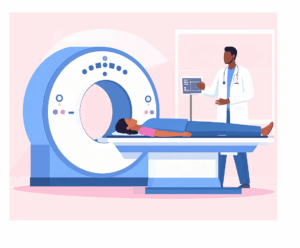Module 3 – Informing Patients & Obtaining Consent
Ethics Case 3.4
Determining What to Disclose
Mrs. Roitfeld and her wife had just finished moving from Cleveland, OH, to a small town outside of Austin, TX, when she felt an uncomfortable twinge in her lower back. Then the pain set in. Assuming she had strained her back from lifting heavy boxes during the move, she decided to take it easy and rest for the next few days, hoping that the pain would go away on its own. But after a week of being in constant pain, and frightened by a few alarming internet search results, Mrs. Roitfeld decided to make an appointment at a nearby hospital, Red Heart Medical Center.
A few days later Mrs. Roitfeld is seen by Dr. Wright. After going over Mrs. Roitfeld’s medical history and discussing the events surrounding her lower back pain, Dr. Wright performs a physical evaluation and quickly realizes that Mrs. Roitfeld is suffering from a simple muscle sprain which takes 4-6 weeks to heal on average. Muscle sprains are very common and rarely require lab testing or diagnostic imaging to accurately diagnose, and muscle sprains do not require any special surgeries or medications (apart from pain killers) in order to heal.
 Even though Dr. Wright has absolutely no doubt that Mrs. Roitfeld is suffering from a simple back sprain and that it will naturally heal in time, he also thinks about offering her the option of undergoing an MRI so that she can have further confirmation of his diagnosis. In his experience, patients often seem more accepting of a diagnosis when advanced diagnostic testing has been performed, regardless of whether it is necessary for the diagnosis, and he sees nothing wrong with giving Mrs. Roitfeld that option.
Even though Dr. Wright has absolutely no doubt that Mrs. Roitfeld is suffering from a simple back sprain and that it will naturally heal in time, he also thinks about offering her the option of undergoing an MRI so that she can have further confirmation of his diagnosis. In his experience, patients often seem more accepting of a diagnosis when advanced diagnostic testing has been performed, regardless of whether it is necessary for the diagnosis, and he sees nothing wrong with giving Mrs. Roitfeld that option.
However, given the significant knowledge and power imbalances between healthcare providers and patients, it is also not uncommon for a patient to interpret a suggestion or mention of a possible care option as a “strong recommendation” instead. This is because from a patient’s perspective, if a healthcare provider is going to take the time to present a possible care option, the patient naturally assumes that the care option must be important and worth consideration.
When thinking about the possible benefits and harms, Dr. Wright knows that although an MRI would be very unlikely to provide any additional or useful information about Mrs. Roitfeld’s back pain, it is also very low-risk and unlikely to cause any physical harm to Mrs. Roitfeld. On the other hand, he also knows that performing an MRI might lead to additional testing and concern for Mrs. Roitfeld. This is because in about 60% of cases, an MRI will identify some feature that raises alarm and indicates the need for additional testing, but upon further testing it turns out to simply be a false positive 86% of the time. This means that in over half of cases, an MRI for back pain will lead to unnecessary follow-up testing.
However, because “unnecessary follow-up testing” isn’t an obvious “harm” or “side-effect” in the usual sense, Dr. Wright is unsure if he needs to disclose this as a potential risk when discussing the MRI. Although there could be psychological or emotional distress from thinking that something significant might be wrong, and there could be physical harms associated with the follow-up tests, Dr. Wright doesn’t view either of these as resulting directly from the MRI itself.
While the price of an MRI can vary significantly between hospitals, at Red Heart Medical Center an MRI costs $1,650. From experience, Dr. Wright knows that Mrs. Roitfeld’s insurance is extremely unlikely to cover any of this cost. This is because insurers require clear medical justifications before they will cover or reimburse the cost of care, and this rarely includes elective services that are deemed medically unnecessary. Given that the MRI is not expected to produce any useful information about Mrs. Roitfeld’s care at this moment in time, Dr. Wright would be lying to the insurance company if he indicated that the MRI is medically necessary for her care.
For these reasons, Dr. Wright thinks it is appropriate to present Mrs. Roitfeld with the option of an MRI but without formally recommending it. If she agrees to the MRI, Mrs. Roitfeld will almost certainly have to pay the full amount out-of-pocket, and possibly the cost of any follow-up testing as well. However, Dr. Wright sees this as her personal business, and because it doesn’t directly affect her ability to receive medical care, Dr. Wright doesn’t think that it’s his responsibility to inform Mrs. Roitfeld of this financial aspect or to offer any advice about checking with her insurance company regarding claim coverage or a pre-approval.
However, the MRI technician who helps to perform the MRI scans has become concerned that Dr. Wright’s patients aren’t being sufficiently informed before providing their consent. Even though the technician also has doubts about whether the MRI should even be offered in some cases, she can’t stop Dr. Wright from mentioning it to his patients, so the next best thing is to help to ensure that his patients are being adequately informed before providing consent. To get help with this, the MRI technician has requested an ethics consultation to clarify what information should be provided to patients such as Mrs. Roitfeld when obtaining their informed consent for an MRI.

